|
|
|
Sort Order |
|
|
|
Items / Page
|
|
|
|
|
|
|
| Srl | Item |
| 1 |
ID:
163440
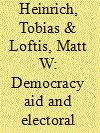

|
|
|
|
|
| Summary/Abstract |
Although foreign policies often fail to successfully promote democracy, over a decade of empirical research indicates that foreign aid specifically for democracy promotion is remarkably successful at improving the survival and institutional strength of fragile democracies. However, these measures cannot tell us how well democracy aid supports the central promise of democracy: accountable government. Since institutions can be subverted in various ways that undermine accountability, it is vital to know whether democracy aid supports accountability to assess its overall success. We provide evidence for this by analyzing incumbent turnover in elections, following poor economic performance—the economic vote—as a measure of voting to achieve performance accountability. In our analysis of over 1,100 elections in 114 developing countries between 1975 and 2010, we find distinct evidence that increasing receipt of democracy aid is associated with more economic voting. Results are robust to numerous alternative empirical specifications.
|
|
|
|
|
|
|
|
|
|
|
|
|
|
|
|
| 2 |
ID:
109937
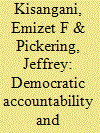

|
|
|
|
|
| Publication |
2011.
|
| Summary/Abstract |
Agreement on which democratic regime types are prone to use diversionary force has yet to materialize in the embryonic empirical literature on the subject. Nor has consensus emerged on the theoretical approach that best explains the diversionary tendencies of different democratic political systems. By separating out benevolent and belligerent diversionary military missions, we begin to offer some clarity to this mixed empirical literature. In zero-inflated Poisson estimates of fifty-six democracies from 1950 to 2004, we find compelling evidence that a theoretical framework emphasizing leader accountability best explains democratic diversionary behavior. More accountable democratic executives (leaders of majoritarian, weak-party majority, and minority governments) appear significantly more likely to use diversionary force than counterparts with less accountability (especially in coalition governments). Democratic leaders also seem to use benevolent military force for diversionary purposes more often than belligerent force, though they still use the latter in specific contexts.
|
|
|
|
|
|
|
|
|
|
|
|
|
|
|
|
| 3 |
ID:
160741
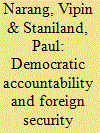

|
|
|
|
|
| Summary/Abstract |
Identifying the links between democracy and foreign security policy has proven elusive. This paper engages this research agenda by developing a novel theory of “accountability environments” and exploring it in the case of India. We hypothesize that the varying electoral salience of foreign security policy and the clarity of responsibility for policy outcomes combine to create different accountability environments in which politicians operate. Accountability environments determine the incentives that politicians face for devoting effort to external security issues. We illustrate the argument with evidence from India over time and across issue areas (India, Pakistan, and defense procurement/development). Scholars need to incorporate the complexities and diversity of representation and rule into the study of democratic politics and international relations.
|
|
|
|
|
|
|
|
|
|
|
|
|
|
|
|
| 4 |
ID:
097794
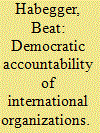

|
|
|
|
|
| Publication |
2010.
|
| Summary/Abstract |
Many international organizations, including the United Nations, are accused of lacking democratic accountability. A variety of proposals have been made to close the gap between their extended influence and the lack of effective controlling mechanisms to prevent abuses of power. This article focuses on one specific proposal: the establishment of parliamentary assemblies. Based on the experiences of the Council of Europe and the Organization for Security and Cooperation in Europe, it presents the factors that enable such assemblies to exercise parliamentary control and influence towards intergovernmental decision-making bodies.The article shows how a parliamentary dimension can be introduced conceptually into the debate on the democratic accountability of international organizations and how these insights support the reflections on a United Nations parliamentary assembly.
|
|
|
|
|
|
|
|
|
|
|
|
|
|
|
|
| 5 |
ID:
095558
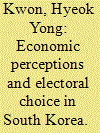

|
|
|
|
|
| Publication |
2010.
|
| Summary/Abstract |
While the notion that subjective economic perceptions as well as objective economic conditions affect electoral outcomes has long been explored in advanced democracies and new democracies, evidence of the link between the economy and elections has been rarely found in East Asian countries. As economic issues have become salient since the 1997 financial crisis, political leaders' capacity to manage the economy has become one of the most important criteria in electoral choice in East Asia. This paper examines how economic issues influenced the results of the 2007 presidential election in South Korea. By making use of the 2007 Presidential Election Panel Study, this study examines the continuity of and changes in the Korean voters' electoral behavior. This study describes the political situation in the post-1997 financial crisis period under two liberal governments in Korea and introduces the processes and characteristics of electoral campaigns in the 2007 presidential election. This paper then explores the link between the economy and vote choice, focusing on whether economic issues were salient among the electorate, whether retrospective or prospective economic voting was prevalent among Koreans, and how the voters supported Lee Myung Bak across age groups, regions, and parties in the 2007 presidential election.
|
|
|
|
|
|
|
|
|
|
|
|
|
|
|
|
| 6 |
ID:
148517
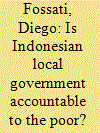

|
|
|
|
|
| Summary/Abstract |
Since decentralization in 2001, Indonesian local governments have acquired a key role in poverty alleviation and social service delivery. The extent to which they have been able to meet this challenge is subject to debate, however, and systematic analysis of policy outcomes remains scarce. This paper contributes to the literature with a study of the district-level implementation of Jamkesmas, Indonesia's free healthcare program for the poor. Using original data on policy implementation, I show that local government is to some extent responsive to the needs of the most vulnerable. In years when local elections (pilkada) are implemented, low-income households are targeted more accurately, suggesting that electoral incentives for local elites may increase access to social services among the poor. However, I also show that the positive effect of local direct elections is limited to districts with electorally competitive politics.
|
|
|
|
|
|
|
|
|
|
|
|
|
|
|
|
| 7 |
ID:
138419


|
|
|
|
|
| Summary/Abstract |
A credible opposition is necessary for democratic accountability. However, in a multiparty democracy, a credible opposition may fail to emerge when it is in the strategic interest of political parties to collude rather than compete, effectively extinguishing all credible opposition. The author argues that illicit collusion among parties on a representative council is more likely when all viable parties win seats and are thus able to enter into a self-binding commitment to jointly engage in misconduct without risk of exposure. Conversely, when at least one party fails to win representation on the council, there is a credible opposition with the incentive and ability to threaten exposure of rent seeking among council members. The theory is tested using a regression discontinuity design where the electoral threshold to win a single seat is, within a narrow band, an exogenous determinant of whether or not there is an out-party or credible opposition. Exploiting the fact that Mali's decentralization produces within-country variation in both electoral and governance outcomes, the author uses data from commune council elections alongside local-level public goods provision as a measure of rent seeking. Poorer public goods provision is indeed more likely when all political parties in a district win seats on the council. To show that collusion is the mechanism driving this relationship, the author tests several observable implications in the data and uses qualitative evidence as illustration. This examination of when it is in the strategic interest of parties to engage in uncompetitive behavior contributes to the literature on when elections fail to produce democratic accountability.
|
|
|
|
|
|
|
|
|
|
|
|
|
|
|
|
| 8 |
ID:
185032


|
|
|
|
|
| Summary/Abstract |
Does motivated reasoning harm democratic accountability? Substantial evidence from political behavior research indicates that voters have “directional motives” beyond accuracy, which is often taken as evidence that they are ill equipped to hold politicians accountable. We develop a model of electoral accountability with voters as motivated reasoners. Directional motives have two effects: (1) divergence—voters with different preferences hold different beliefs, and (2) desensitization—the relationship between incumbent performance and voter beliefs is weakened. While motivated reasoning does harm accountability, this is generally driven by desensitized voters rather than polarized partisans with politically motivated divergent beliefs. We also analyze the relationship between government performance and vote shares, showing that while motivated reasoning always weakens this relationship, we cannot infer that accountability is also harmed. Finally, we show that our model can be mapped to standard models in which voters are fully Bayesian but have different preferences or information.
|
|
|
|
|
|
|
|
|
|
|
|
|
|
|
|
| 9 |
ID:
102690


|
|
|
| 10 |
ID:
127836
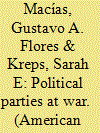

|
|
|
|
|
| Publication |
2013.
|
| Summary/Abstract |
What determines when states adopt war taxes to finance the cost of conflict? We address this question with a study of war taxes in the United States between 1789 and 2010. Using logit estimation of the determinants of war taxes, an analysis of roll-call votes on war tax legislation, and a historical case study of the Civil War, we provide evidence that partisan fiscal differences account for whether the United States finances its conflicts through war taxes or opts for alternatives such as borrowing or expanding the money supply. Because the fiscal policies implemented to raise the revenues for war have considerable and often enduring redistributive impacts, war finance-in particular, war taxation-becomes a high-stakes political opportunity to advance the fiscal interests of core constituencies. Insofar as the alternatives to taxation shroud the actual costs of war, the findings have important implications for democratic accountability and the conduct of conflict.
|
|
|
|
|
|
|
|
|
|
|
|
|
|
|
|
|
|
|
|
|